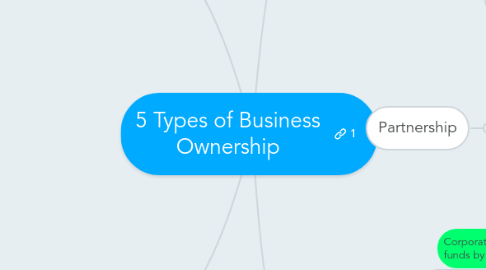5 Types of Business Ownership
by Abieram Sathiy

1. Co-operative
1.1. Easy Formation
1.2. Democratic Management
1.3. Limited liability
1.4. Possible conflict between members
1.5. Participation of all members is required in order to succeed
1.6. Extensive record keeping
2. Franchise
2.1. The risk of business failure is reduced by franchising
2.2. Products and services will have already established a market share
2.3. Financing the business may be easier
2.4. Costs may be higher than you expect
2.5. The franchise agreement usually includes restrictions on how you can run the business
2.6. The franchisor might go out of business
3. Sole Proprietorship
3.1. Easy and inexpensive to register
3.2. Regulatory burden is generally light
3.3. All profits go to you directly
3.4. Unlimited liability
3.5. Lack of continuity for your business if you are unavailable
3.6. Can be difficult to raise capital on your own
4. Partnership
4.1. the ability to raise funds may be increased
4.2. Start-up costs are shared equally with you and your partner(s)
4.3. Equal share in the management and profits
4.4. Unlimited liability
4.5. Can be difficult to find a suitable partner
4.6. Profits must be shared with others
5. Corporation
5.1. Corporations may be able raise additional funds by selling shares in the corporation
5.2. Limited liability
5.3. Ownership is transferable
5.4. Possible conflict between shareholders and directors
5.5. Forming a corporation requires more time and money
5.6. A corporation is closely regulated


